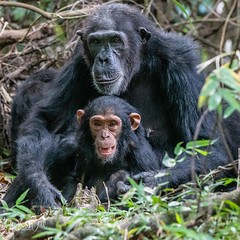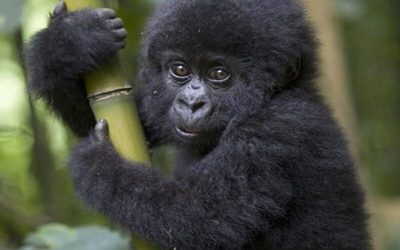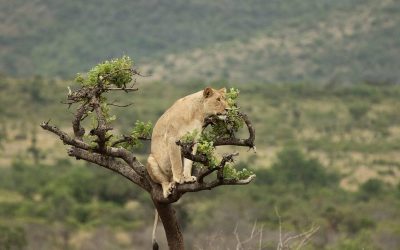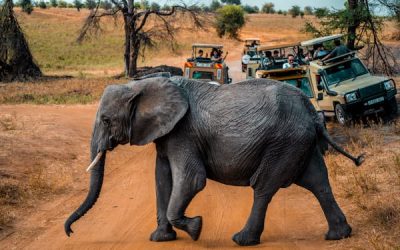Chimpanzee trekking in Rwanda is a popular activity second only to gorilla trekking. This exciting adventure happens in Nyungwe Forest National Park located about 5 to 6 hours southwest of Kigali, the capital city of Rwanda. Nyungwe is an ancient mountain forest that has existed since the ice age. It is home to many unique plants and animals making it a biodiverse area.
In Nyungwe National Park, visitors can find 13 species of primates including a large number of chimpanzees who are our closest relatives. There are over 500 chimpanzees in the park which gives visitors a great chance to see them in their natural habitat. Watching these amazing creatures swing through the trees and interact with each other is a memorable experience.
While there are also chimpanzees in Gishwati-Mukura National Park, trekking is not currently offered there as chimpanzees of that park are not yet habituated. Nyungwe is the best place for those looking to observe chimps up close.
During a trekking tour, trained guides lead small groups through the lush forest. They help spot the chimps and share interesting facts about their behavior and habitat. Trekking can be physically challenging but the experience of being among these fascinating animals makes it worth it. Many travelers leave with unforgettable memories and a deeper appreciation for wildlife and nature. If you love animals and adventure, chimpanzee trekking in Rwanda is a fantastic choice.
Chimpanzee Trekking in Rwanda: What to Expect
Chimpanzee trekking in Rwanda is an exciting and safe adventure for those who want to see these amazing animals in their natural habitat. Here’s a simple guide on how the process works and what you can expect during your visit to Nyungwe National Park.
in Rwanda is an exciting and safe adventure for those who want to see these amazing animals in their natural habitat. Here’s a simple guide on how the process works and what you can expect during your visit to Nyungwe National Park.
Is it Safe to See Wild Chimpanzees?
Yes, it is safe to see wild chimpanzees in Rwanda thanks to a process called habituation. Habituation involves trained personnel who regularly visit wild chimps. At first, these chimps might be scared or even aggressive towards humans. The goal is to help them get used to human presence until they no longer see people as a threat. This process can take several years. Once the chimps are comfortable, they become more tolerant of visitors. All chimp trekking tours are led by park guides who are familiar to the chimps, which helps ensure the safety of both the chimps and the visitors.
How Are the Chimps Found in Nyungwe National Park?
Chimpanzees live in communities, and Nyungwe National Park is home to three different chimpanzee communities that are habituated for trekking tours.
Cyamudongo Community: This group lives in the Cyamudongo forest, a small area to the east of the main Nyungwe forest. There are about 30 chimps in this community. Given the fact that Cyamudongo is smaller, it is easier to track the chimps here which make sightings more likely. The smaller size of the forest means that even if the chimps move, they are still within reach.
Uwinka Community: This group is located in the main Nyungwe forest around the Uwinka area where the park headquarters is situated. With around 60 chimps, this community is larger. However, Nyungwe forest is vast and has challenging terrain, spotting the chimps can be more difficult compared to the Cyamudongo group. The larger forest means that the chimps can be spread out making sightings less predictable.
Gisovu Community: The Gisovu group lives in a remote part of the main Nyungwe forest near Kibuye town to the north. This is the newest habituated group, so they are still getting used to human visitors. They might be more likely to flee or move quickly when approached. Over time they will become more accustomed to tourists.
How Are the Chances of Finding the Chimps?
Before setting out on a trek, the track assesses the likelihood of seeing the chimps. This assessment helps guide the trek to areas where sightings are most probable. While there is always a small chance that the chimps might not be found, these assessments help ensure that tourists have a high chance of spotting them.
Chimpanzee trekking in Nyungwe National Park is a well-organized and safe activity. With the help of experienced guides and the habituation process, visitors can enjoy an unforgettable experience observing these fascinating creatures up close.
Where and When Does Chimpanzee Trekking Start?
Chimpanzee trekking tours in Nyungwe National Park start from two main locations:
Gisakura Ranger Station: This station is used for tracking the Uwinka and Cyamudongo chimpanzee groups.
Gisovu: This is where you start if you are tracking the Gisovu chimpanzee group.
You should arrive at the ranger station between 6:30 a.m. and 7:00 a.m. This early arrival is essential to meet with park guides for a briefing. By 7:00 a.m. you will be transferred to the starting point of the trek into the park. Only one trekking session is available each day and it is always in the early morning.
Important Note: If you are assigned to the Gisovu chimpanzee group, it is best to stay in Kibuye town. Kibuye is the closest place to Gisovu and offers many hotels. Although Kibuye is a beautiful lakeside town on Lake Kivu, it is still about a one-hour drive to Gisovu.
How Long Does It Take to Find the Chimps?
Chimpanzees do not stay in one place. They build new nests each day, so their location changes frequently. Because of this finding them can be unpredictable. Secondly, chimps also move quickly once they wake up making it a bit challenging to locate them.
Park trackers help by going ahead of the trekking group and locate the chimpanzee groups. They try to find the chimps before they leave their nests or track them soon after. The trackers then inform the guides of the chimps’ location. The guides use this information to plan the best route for the trekkers. On average, it takes about 2 to 3 hours of trekking to find the chimpanzees. This time can vary depending on the chimps’ movements and the terrain.
How Long Can You Spend with the Chimps?
Once the chimps are found, tourists are allowed to spend up to one hour observing them. This time is a fantastic opportunity to see the chimps up close as they interact and go about their daily lives. Watching them helps you understand why chimps are called our closest relatives, sharing about 98.7% of our DNA.
Chimpanzees often communicate with loud screams, pant hoots, and the sound of slapping tree barks. This communication can be thrilling and is unlike anything you have experienced before.
Chimpanzee vs. Gorilla Trekking
 If you have been on a gorilla trek or are planning one, you’ll notice that chimpanzee trekking is quite different. Chimps are very active and spend a lot of time running and swinging through the trees. This means you might need to keep up with them as they move around and sightings can be more sporadic compared to the more stationary gorillas.
If you have been on a gorilla trek or are planning one, you’ll notice that chimpanzee trekking is quite different. Chimps are very active and spend a lot of time running and swinging through the trees. This means you might need to keep up with them as they move around and sightings can be more sporadic compared to the more stationary gorillas.
Cost and Preparation for Chimpanzee Trekking in Rwanda
Chimpanzee trekking in Rwanda is an incredible adventure, but it’s important to be aware of the costs and requirements before you go.
Cost of Chimpanzee Trekking
The total cost of chimpanzee trekking in Nyungwe National Park includes two main components:
Chimpanzee Tracking Permit: This permit is required to go on the trek and includes the services of a guide. The cost varies depending on the type of visitor:
- International Visitor: $150
- Foreign Resident in Rwanda/East Africa: $75
- Rwanda/East African Citizen: $25
- Park Entry Fees: These fees are charged in addition to the tracking permit. The costs are:
- International Visitor: $100
- Foreign Resident in Rwanda/East Africa: $60
- African Citizen (other than East Africa): $60
- Rwanda/East African Citizen: $10
If you are an international visitor, the total cost for the chimpanzee trekking tour in Nyungwe would be $150 for the permit plus $100 for the park entry fee, making a total of $250.
Age Limit
Only people aged 16 years and above are allowed to go on chimpanzee treks. This age restriction is in place to ensure the safety and comfort of both the visitors and the chimpanzees.
Availability and Booking
Each day, only 8 tourists are permitted to track each of the three habituated chimpanzee groups. This means that only 24 permits are available each day. Given the limited number of permits and the high interest in chimpanzee trekking, it’s recommended to book your tour well in advance to secure your spot.
Tips for Chimpanzee Trekking in Rwanda
Fitness Level: While average fitness is acceptable, being in good shape will enhance your experience. Chimps are very active and move quickly through the trees so you might need to run to keep up with them.
Essential Items to Carry:
- Hiking Shoes or Sneakers: Choose shoes with good traction to navigate the forest trails.
- Long Pants and Long-Sleeved Shirt: These will protect your skin from scratches and insect bites.
- Rain Jacket: The weather can be unpredictable, and a rain jacket will keep you dry.
- Sunscreen: Protect your skin from the sun, especially if you’ll be exposed for a long time.
- Insect Repellent: This will help keep mosquitoes and other insects away.
On the day of the trek, it’s also a good idea to bring at least two liters of drinking water and some snacks. The trek can be long and having water and food will help you stay energized and hydrated. You will have a short break during the trek to eat and rest if needed.
The 3 days Rwanda gorilla Tour takes you through the Kigali, for the city tour to Volcanoes national park where you will have a lifetime experience, visiting the mountain gorillas and live you with a memorable experience
| Trip details |
| Contact Us |
This 9 days Rwanda gorilla tour includes stops at Volcanoes National Park, Akagera for a Big 5 safari, and Nyungwe or Kyamudongo forest for chimpanzee tracking. Beginning with a city tour of Kigali
| Trip details |
| Contact Us |
This is the most rewarding adventure among all adventure safaris in Rwanda, it explores the 3 Rwanda’s National Parks. The adventure starts from and ends in Kigali, tracking through Akagera National Park
| Trip details |
| Contact Us |



